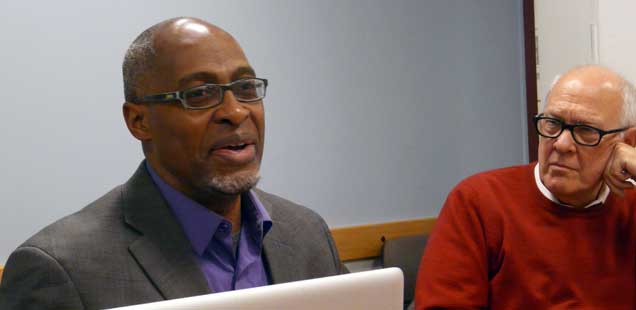April 7, 2015 — Phillip Martin, senior investigative reporter at WGBH, discussed how his reporting on race and poverty has been shaped by his early career experiences.
Martin’s interest in journalism was partially sparked by a lack of nuanced coverage of poor people and people of color by mainstream media. As a teenager during the 1967 Detroit riot, he remembered the local TV anchorman “referring to people in the neighborhood as wild animals” – a far cry from his churchgoing neighbors, or a neighborhood boy who was beaten by members of the National Guard for violating a curfew.
By the mid-1970s Martin wanted to leave Detroit, and was both intrigued and disturbed by news he heard coming out of Boston in the midst of the busing crisis. He landed an internship at WBCN where he worked with the late Danny Schechter, whose coverage he admired because it was not a “stick-figured, one-dimensional view of poverty.”
Martin moved between working in the media and at NGOs such as Oxfam, learning along that way that racism was far from unique to the U.S. Residents of Brazil, the Middle East, and most explicitly, South Africa, also experienced marginalization based on colorism, said Martin.
For a time, Martin said he was “conflicted about journalism…because I wasn’t sure if I could really explore what I considered to be very fundamental problems of race and conflict and violence in our own nation …the reason I was conflicted was largely because of the [media] institutions that existed at that time.”
“By coincidence,” PRI’s “The World” asked Martin to produce the radio program in 1995, which allowed him the freedom to explore “the intersection of international relations and race.” Then in 1998, he was hired as NPR’s first race-relations reporter.
Acknowledging a lack of economic diversity in newsrooms, Martin said that one of the best ways to cover stories about poverty is “to let people speak for themselves.”
“We exist in a society where – for good reason – information is interpreted by experts. But often times…they allow their expertise to become the proxy, the substitute for the way people are really feeling, and I think that is problematic.”
Hear Martin discuss the changing characteristics of racial segregation, race relations, and income inequality in Boston, and a conversation about diversity in media organizations in the full audio recording above.
Article and photo by Nilagia McCoy of the Shorenstein Center.


